Blues Reviews Aug/Sept 2021
 Various Artists
Various Artists
50 Years of Genuine Houserockin’ Music
Alligator Records 2021
What we have here is a delightful deployment of dynamic digital dynamite! (I received the collection digitally; it’s also available on three CDs or two LPs.) Elsewhere in this issue is the story of Alligator Records in words. Here is the story in music.
Indisputably one of the premier blues labels since its inception in 1971, Alligator Records has hosted a truly mind-boggling array of performers. Some of them - Hound Dog Taylor and Koko Taylor, to name two – were on from the beginning or soon after. Some were established stars who found a new commercial home with Alligator. Some debuted on Alligator. Some stayed with the label for their entire careers. Some left, and quite a few of those returned. Some have just recently joined the label as it embarks on its sixth decade. All benefit from a label which respects their art and gives them freedom to express themselves.
This collection comprises a full four hours of compelling blues. Although there is a brief nod to acoustic blues with the inclusion of a track by John Cephas and Phil Wiggins, the preponderance is electric blues in a band format, and the majority is of the sub-genre of Chicago blues. Alligator has never lacked for variety, though, as evidenced by such Louisiana artists as Katie Webster, Professor Longhair, and Marcia Ball. (These three skilled pianists also prove that it’s not only guitar hero worship that we find here.) Texas blues? How about Long John Hunter, Johnny Winter, and Albert Collins? Mississippi? Young phenom Christone “Kingfish” Ingram. Chris Cain, William Clarke, The Paladins, and Tommy Castro belie any neglect of the West Coast.
There are fifty-eight tracks in the collection, and each track is by a different artist, showcasing Alligator’s extensive roster of talent. Wise curation has resulted in the presentation of some blues classics along with some equally worthy but obscure sides. In the former category, Clarence “Gatemouth” Brown delivers his unique version of “Got My Mojo Working,” Hound Dog Taylor & The Houserockers demand “Give Me Back My Wig,” and Koko Taylor, the late Queen of the Blues, declares in no uncertain terms that “I’m a Woman.” Of the lesser-known tunes, check out “Ain’t No Fun (When the Rabbit’s Got the Gun)” by the Cash Box Kings, and “I Got a Rich Man’s Woman” by Carey Bell. Along the way we get to enjoy the immediately recognizable distinctive guitar styles of Collins, Son Seals, Lonnie Mack, and Roy Buchanan, all of whom established their credibility and uniqueness on Alligator.
The pace is generally mid-tempo to rocking, with plenty of tracks to induce dance fever.
Among the slower tracks is “The Longer That I Live” by top-notch soul blues singer Curtis Salgado, and the poignant “A Woman” by JJ Grey & Mofro. Contributions from the last two years by Cain, Salgado, Selwyn Birchwood, Ingram, Tinsley Ellis, and Elvin Bishop and Charlie Musselwhite decidedly confirm that Alligator continues to present premium talent.
Fifty years of some of the best electric blues ever recorded. I can hardly wait for the next fifty.—Steve Daniels
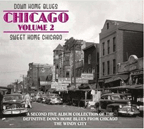
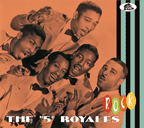 The “5” Royales
The “5” Royales
Rock!
Bear Family CD
Down Home Blues—Chicago 2
Sweet Home Chicago
Weinerworld 5CD
Originally a gospel group from Winston-Salem, North Carolina known as the Royal Sons Quintet, the “5” Royales, along with Ray Charles and Clyde McPhatter, were potent pioneers in the development of the sacred/secular musical hybrid where the vocals are deeply rooted in the transfixingly melismatic-heavy Southern gospel tradition. Switching over to rhythm ‘n’ blues they immediately had a pair of chart toppers, “Baby Don’t Do It” and “Help Me Somebody” for Apollo in 1953, with lead singer Johnny Tanner’s robust, down-to-earth vocals embracing the intense sense of conviction that is characteristic of post-war gospel quartet singing. Subsequent recordings for the King label, including “Think” and “Dedicated To The One I Love” (charters in 1957 and 1961 respectively) were equally gritty, thanks to Lowman Pauling’s infectiously explosive lead guitar work. A 32 page booklet, in addition to containing an abundance of label and performance shots along with a full discography, also features a lengthy career wrap-up essay by researcher Bill Dahl that closes thusly: “Without the “5” Royales, the future of soul music would have followed a very different, less satisfying path. They proved beyond any doubt that secular and sacred could co-exist magnificently in the world of rhythm and blues.” This long overdue, 31 track album collects an abundance of their killer singles that, for whatever reason, mostly failed to crack the charts. Sweet Home Chicago Volume 2, a follow-up five CD extravaganza to 2017’s Volume 1 (Fine Boogie), features 135 tracks of undiluted Chicago blues recorded from the mid-1940s through the golden decade years of the 1950s up to the early 1960s. Developing from a synthesis of regional Southern blues styles with a sound typified by strongly amplified guitars, piano, bass and drums and, frequently, harmonica is best epitomized by Muddy Waters and his crackerjack band that boasted the likes of Little Walter, Otis Spann, Willie Dixon and Jimmy Rogers. All of whom are generously represented here along with the likes of Elmore James, Howlin’ Wolf, Memphis Minnie, Sonny Boy Williamson, Billy Boy Arnold, Eddie Boyd, Albert King, Henry Gray and Johnny Shimes as well as early down home recordings from Chuck Berry, Jimmy Reed and Bo Diddley just as they were on the CUSP of taking their music into the big new world of rock and roll. Ace compiler Peter Moody continues the mix of well-known artists with the lesser known (Blue Smitty, Dirty Red, Forest City Joe, Alfred Harris, Morris Pejoe, Little Mack Simmons and Slim Willis for example) with all the recordings top-notch Chicago masterworks. Extras include a reflective 94 page booklet with a new essay by blues historian Mike Rowe on the post-war Chicago scene illustrated by over 50 rare period photos (eight previously unpublished) along with full track details as well as a complete sessionography and an abundance of 78 and 45 label shots. I wonder if there’s enough for a Volume Three?—Gary von Tersch
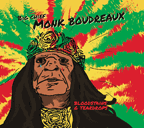 Big Chief Monk Boudreaux
Big Chief Monk Boudreaux
Bloodstains & Teardrops
Whiskey Bayou Records
Joseph “Monk” Boudreaux is a New Orleans legend. At seventy-nine, he is the oldest living Mardi Gras Indian chief, the Elder of Elders in a tradition dating back to the 1800s. He is one of New Orleans’ most recognizable icons, as his image is seen in murals painted on many of the city’s walls and in many documentaries about the Crescent City. His singing career is just as respected: he was a member of the Wild Magnolias for thirty years and since 2001 he has participated in various ventures including the Voice of the Wetlands group with Tab Benoit, Dr. John and Cyril Neville as well as the Golden Eagles and has numerous solo releases to his name.
Bloodstains & Teardrops is the result of an inspiring trip to Jamaica that Boudreaux took with co-producer Rueben Williams and guitarist Damon Fowler several years ago. Six of the tracks were recorded in Kingston with top reggae session musicians. Some of the tunes were directly influenced by Boudreaux’s experience in Jamaica. “Kingston Blues” is about the similarities between that city and New Orleans. Boudreaux said, “We just rode around and we saw a lot of places where we passed the guys were just hanging out in the street. It felt like home.” “Blue Mountains” is about his trip “going to the mountain top” to visit Bob Marley’s grave. Boudreaux had found out on the trip that Marley was a huge fan of New Orleans music as well as Boudreaux’s work with the Wild Magnolias. And it’s been a known fact that the musicians creating the earliest reggae and its predecessors ‘rock steady’ and ‘ska’ were heavily influenced by New Orleans rhythm and blues that shot across the radio airwaves over the sea from the United States mainland all the way to Jamaica.
Bloodstains & Teardrops mostly alternates between the tracks cut in Kingston with the four tracks cut in New Orleans by co-producer/guitarist/drummer Tab Benoit with a cast of south Louisiana musicians. The album really blurs the line and connection between Jamaican and Louisiana music as both places have many things in common: British ruled, sugar cane production, parish divide and of course located on the sea and being an entry point for many different cultures.
The tracks featuring the vocal interplay between Big Chief and Jamaican vocalist Ali Meek are highlights. Meek’s toastmaster style is a perfect foil for Boudreaux’s more deadpan but stream of consciousness lyrics. These include the opening title track and “Mr. Okra Man.” The song “Kick Me Down,” recorded with the Jamaicans is a pleasure, featuring an infectious guitar line. The tracks cut with Benoit at the helm stay mostly within the blues element although the song “Blue Mountains” is a definite rocker. “Kingston Blues” and “Indian Blues” both have slow steamy, blues grooves, the latter featuring some tasty violin from Michael Doucet. Those last two tunes mentioned have some great guitar work, however the liner notes credits five different guitar players on the recording and doesn’t specify who exactly is on each track. Most of us know that the multi-talented Tab Benoit is an excellent guitarist and it wouldn’t surprise anyone if it was Tab shredding on one or both of those tunes. And, of course, it is Big Chief Boudreaux’s presence that ties the whole album together. This is a unique album to be enjoyed by both lovers of reggae and Crescent City music alike. – Bob Monteleone
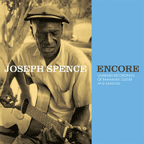 Joseph Spence
Joseph Spence
Encore Smithsonian
Folkways CD
Recorded and produced by Peter K. Siegel, Encore is a new album sourced from precedently unheard archival recordings by the storied Bahamian guitarist Joseph Spence, made in 1965 when he was at the peak of his powers. Spence’s intrinsically cutting-edge guitar style converted various elements of Bahamian orthodox music into enterprisingly heartening improvisations, influencing musicians globally. His robustly compelling singing derived directly from the rhyming tradition devised by sponge fishermen early in the 20th century. The makeshift fretwork is interspersed by Spence’s remarkably uncommon, at times entrancing vocalizations including humming, abrupt bursts of lyrics and near-scat singing. A few of the recordings, namely “Out On The Rolling Sea,” “Death And The Woman” and “That Glad Reunion Day,” also feature sympathetic singing by Spence’s sister Edith Pinder with “Reunion” also featuring her family members Raymond and Geneva Pinder. Other picks include the sprightly “Won’t That Be A Happy Time?,” the African dance tune “The Crow,” the extensively disseminated traditional spiritual “Give Me That Old Time Religion,” a calypso-tinged “Brown Skin Girl” and “Run Come See Jerusalem”—a well-known ballad about a 1929 hurricane that devastated the Bahamas. Spence has often been called the folk guitarist’s Thelonious Monk. Here’s why.—Gary von Tersch
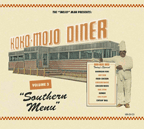
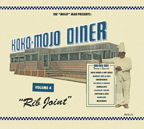 Koko-Mojo Diner: Volume 3
Koko-Mojo Diner: Volume 3
Southern Menu
Koko-Mojo Diner: Volume 4
Rib Joint
The term “Soul Food” became trendy in the 1960s and 1970s as the Black Power movement was gaining momentum in the United States. One of the earliest written usages of the term is found in The Autobiography Of Malcolm X, published in 1965. Leroi Jones also published an article entitled Soul Food and was a key exponent in instituting the mostly home-grown food as a part of the emerging Black American identity. Those who took part in the Great Migration detected in Soul Food a remembrance of the families and homes they had left behind after moving to far-flung and unfamiliar Northern cities. A typical dinner, for instance, might consist of fried chicken with sides of macaroni and cheese, cornbread. collard greens and fried okra with a large slice of just-baked peach pie for dessert. Also, crucially, Soul Food restaurants were black-owned businesses that also served as gathering places where folks socialized and broke bread together. Curated once more by the” Mojo Man” aka Little Victor Mac these two follow-up Volumes to the initial pair (reviewed in last month’s issue) are just as much fun. Notable numbers on Volume 3 include “Chicken Stuff” by Hop Wilson And His Chickens; “Shortnin’ Bread Rock” with Etta “Miss Peaches” James; “Everybody Eats When They Come To My House” by Cab Calloway; a sizzling instrumental, “Ham ‘N’ Eggs” served up by Count Basie; a jumping “They’re Red Hot” by Robert Johnson; a mellow, jazzy instrumental homage to humble “Cole Slaw” from Bill Jennings and Jack McDuff and “Barbecue Any Old Time” by Brownie McGhee. Lesser-known artists also impress a la Skip Manning, the Marylanders, Bulee Gaillard And His Southern Fried Orchestra (“Eatin’ With The Boogie”), Titus Turner (who is a “Hungry Man”), Kid King’s Combo, Danny Bell And The Bell Hops, the Scamps and Don And Juan with “Chicken Necks.” Volume 4 is more of the same that begins with the great Harold Burrage’s gustatory commentary “You Eat Too Much” and closes, 27 tracks later, with the Marathons championing “Peanut Butter” with room along the way for a raft of tasty instrumentals including Felix Garcia’s “Two Tacos,” Ernie Freeman’s dreamy “Dumplins,” Sam Price And His Texas Bluesicians’ sax-wailing “Rib Joint,” Eddie “Cleanhead” Vinson’s classic “Kidney Stew” and Kenny Burrell’s moody “Chitlins Con Carne.” Further picks begin with Mike Pedicin’s late-night testimonial to “Burnt Toast And Black Coffee,” Jim Jackson’s hallucinatory “I Heard The Voice Of A Pork Chop,” Fats Waller’s ribald classic “All That Meat & No Potatoes,” Wynonie Harris’ double-entendre claim “I Like My Baby’s Pudding” and Big Ed & His Combo with a rocking “Biscuit Baking Mama.” All in all, an inventive, eye-opening quartet of albums guaranteed to fire up your taste buds!—Gary von Tersch
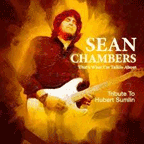 Sean Chambers
Sean Chambers
That’s What I’m Talking About
Quarto Valley Records
Florida Gulf Coast-born Sean Chambers began his career in the blues back in 1998 when he began performing as guitarist and bandleader with his mentor and friend the legendary Hubert Sumlin for nearly five years. With his eighth album, he pays tribute to the former long-time Howlin’ Wolf guitarist with ten tracks that he used to regularly play as a member of Sumlin’s touring band along with the rock and rolling, drums pounding “Hubert’s Song”—a Chambers original hailing the spirit of Sumlin. The music promulgates a tour-de-force display of Chambers’ blazingly blistering guitar pyrotechnics—that proves equal parts Stevie Ray Vaughan and Jimi Hendrix. Of the ten songs, three are Wolf compositions (a seesawing “Rockin’ Daddy,” the moody testimonial “Forty-Four“ and an emotional plea for “Louise” to come back home) while Willie Dixon penned four (the dance-floor filler “Do The Do,” a fiery “Hidden Charms,” a particularly powerful “Tail Dragger” and a smoking “Howling For My Darling”) with affairs rounded out by Sumlin’s own adventurous instrumental “Chunky” (with guest Bruce Katz on Hammond B3 organ), as well as a top-notch revival of James Oden’s classic downer “Goin’ Down Slow” and an animated yet low-key recall of the traditional “Sittin’ On Top Of The World.” A well-thought out and often mesmerizing project well worth tracking down.—Gary von Tersch
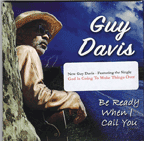 Guy Davis
Guy Davis
Be Ready When I Call You
M. C. Records 2021
It’s cause for celebration: acoustic blues expert Guy Davis has released a new album, his fifteenth in a quarter-century recording career. His previous album, 2017’s “Sonny & Brownie’s Last Train,” gained a Grammy nomination, and similar laurels will probably accompany this new effort.
Davis is accompanied by a group of adept musicians, including keyboardist Professor Louie and guitarists Chris James and John Platania (the latter formerly with Van Morrison years ago). Davis, an accomplished actor, author, and music educator, has applied his creativity to the composition of all but one of the thirteen tracks comprising the hour-long set, and he plies his undiminished instrumental skills on harmonica, banjo, and acoustic guitar as well as of course doing all the singing. The songs cover a range of blues styles and exhibit pithy lyrics.
The opener, “The Badonkadonk Train,” is a jaunty double entendre country blues outing handled solo by Davis on guitar and harmonica. Bass and piano join as he deploys banjo on “Got Your Letter in My Pocket,” a poignant lament of love lost. Then comes “God’s Gonna Make Things Over,” a powerful evocation and condemnation of the massacre of African Americans in Tulsa, Oklahoma, in 1921. Like his late actor parents Ruby Dee and Ossie Davis, Guy has been for years a strong social activist and racial justice campaigner. Those same convictions are evident in two other tracks. “Flint River Blues,” is an acidic criticism of the irresponsibility and implicit racism of officials in Flint, Michigan, and in New Jersey, Davis on guitar buttressed only by a confirmatory vocal chorus. “Palestine, Palestine” asserts the longing of displaced and disenfranchised Palestinians for their homeland, but also acknowledges an equal longing by Israelis for their own homeland. No prescriptive actions are advocated, but the expressed empathy is powerful.
The set proceeds without let-up in quality. “I Got a Job in the City” is a mid-tempo shuffle showcasing Davis’s harmonica facility. “I’ve Looked Around” is a beautiful plea for compassion and succor for refugees, with a talking-blues vibe and some delicious harmony vocals, and “200 Days” is an equally moving tale of an unemployed worker returning to his family. In the middle of the set is the sole cover, of Willie Dixon’s classic “Spoonful,” the ensemble digging deftly into Chicago blues, with Louie doling out a fine piano solo.
The set closes with its shortest track, and it’s worth the wait: “Welcome to My World” is a blues rap, rife with social outrage leavened with humor, about a certain ex-president: “Stormy Daniels [no relative of mine] got you laid/Michael Cohen got you paid/Saudis got a bone saw blade/But you’ve got no soul left to trade…”; musical chops paired with scathing wit. It’s a fine coda to an excellent album.—Steve Daniel
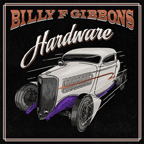 Billy F Gibbons
Billy F Gibbons
Hardware
Concord Records
Lone Star State rock musician Gibbons is best known as the gnarly lead guitarist, gravelly-voiced vocalist and sharp songwriter of the long-lived ZZ Top band that he formed in late 1969 and saw their lauded First Album released in early 1971. This project, his third solo effort was, tellingly, recorded at Escape Studio in California’s high desert, near Palm Springs and as he comments: “We holed up in the desert for a few weeks in the heat of the summer and that in itself was pretty intense. To let off steam we just ‘let it rock’ and that’s what Hardware is really all about—the desert settings, replete with shifting sands, cacti and rattlesnakes makes for the kind of backdrop that lends an element of intrigue reflected in the sounds created out there.” Sounds that include elements of traditional hard rock, country rock, neo-metal, blues, rockabilly, new wave and even surf music make Hardware hard to categorize—in fact, the album’s final track, “Desert High,” is a spooky, spoken-word reflection accompanied by some muscular guitar work that invokes the spirit of the legendary Gram Parsons, whose tragic death 48 years ago occurred close to where Hardware was recorded. Other in-the-pocket tracks include the testimonial “Stackin’ Bones,” that features a guest appearance by Larkin Poe, along with the self-effacingly epigrammatic “I Was A Highway,” a soulfully introspective “Vagabond Man” and the album’s sole cover song—an inspired, dynamic take on the Texas Tornados’ “Hey Baby, Que Paso.” Play loud!—Gary von Tersch
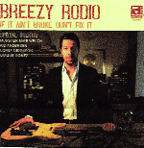 Breezy Rodio
Breezy Rodio
If It Ain’t Broke Don’t Fix It
Delmark 2021
Yes, it’s yet another Chicago blues guitar ace, but as long as their quality remains high, there can’t be too many. Add Breezy Rodio to the list. After almost a decade as guitarist and bandleader with Linsey Alexander, during which he released a couple of his own albums, Breezy has added to the collection with this set of sixteen original compositions, lasting well over a full hour. His stellar guest compatriots include fellow six string mavens Kid Andersen, Monster Mike Welch, and Corey Dennison and Spanish harmonica player Quique Gomez (who has also recorded with Chicago guitarist Johnny Burgin).
The set starts with its title cut, propelled by thumping bass, boisterous horns, a lively vibe, and a fresh mouth harp solo mid-song. The expected lead guitar doesn’t emerge until near the end but is pithy. A jaunty shuffle is then succeeded by “A Woman Don’t Care,” one of the album’s highlights: it’s a slow blues with horns, harmonica, tinkly piano, Breezy’s insistent tenor vocal, and evocative single note guitar fills. Soon after is “A Minute of My Kissing,” a sizzling rocker that represents another album peak. After that: “Look Me in the Eye,” a melding of jump blues and a cabaret show tune, enlivened by a zesty saxophone solo and a jazzy guitar solo.
More surprises are in store. “Led to a Better Life” begins with a poignant, Hawaiian guitar-style introduction that unexpectedly morphs into a devotional rocker with fine piano accompaniment, followed by “The Breeze,” a danceable instrumental. “I’ll Survive” sounds like a reinterpretation of “Sitting on Top of the World”; “Pick Up the Blues” is a traditional Chicago-type twelve bar track with nice harmonica; “Dear Blues” name-checks Albert Collins and employs some Collins-esque riffs.
Continuing the eclectic nature of the set, the penultimate track, “I Need Your Love,” features a 1950s doo-wop sensibility, with harmony backing vocals, and the album ends with “Another Day,” a shuffle again inviting dancers onto the floor.
Expanding from his Chicago blues roots, Breezy Rodio and his ensemble of guests have crafted a variegated and vivacious set of tunes.—Steve Daniels
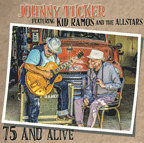 Johnny Tucker With Kid Ramos & The Allstars
Johnny Tucker With Kid Ramos & The Allstars
75 And Alive
Blue Heart Records
For the welcome return to the studio of Fresno, California native Johnny Tucker, who spent decades touring the world as harmony vocalist and drummer for guitarist Phillip Walker, his astute manager Bob Auerbach enlisted Los Angeles’ guitarist-about-town Kid Ramos and versatile pianist Carl “Sunny” Leyland to put together an all-star band. The duo alertly drafted the rhythm section of John Bazz on electric and doghouse bass, drummer Jason Lozano and saxophonist Ron Dziubla along with harmonica maven Bob Corritore. The dozen original tracks recorded here were recorded live off-the-floor and represent a twenty-four carat set of West Coast jump, salacious blues and funky soul, all recorded on Tucker’s 75th birthday on October 17, 2020. Favorites encompass the exuberant party-hearty opener “All Night Long, All Night Wrong,” with Ramos’ crisp, T-Bone Walker-inflected lead guitar work leading the way along with a couple of inspired instrumentals where Ramos and company pay tribute to both Albert Collins, on the buoyant shuffle “Snow Plow,” as well as Earl Hooker on an excitable “Hookline.” Tucker’s persuasive pipes particularly shine on the sprightly, Buddy Guy-inspired “Have A Good Time Tonight,” a wonderfully downbeat “There’s A Time For Love” with its pleading horn lines and a Magic Sam splashed “Treat Me Good”—with Ramos plugged into a flashily Magnatone amp. “It’s got that true vibrato,” notes Ramos. Special guest Corritore’s groove-rich harp not only seasons up the Windy City shuffle “Can’t You See” (with Tucker bewailing for all he’s worth) but invigorates the hard-driving “What’s On My Mind,” where he’s more than ably assisted by Leyland’s vigorous boogie piano work. Well worth investigating!—Gary von Tersch
 Chris Gill
Chris Gill
Between Midnight and Louise
Endless Blues Records
Chris Gill is a Mississippi-based blues guitarist. Not adverse to playing with as many as five other musicians, he is completely at home playing by himself. This record is a solo affair, with no overdubs. Pure with no frills, Between Midnight and Louise, opens and closes with a couple of instrumentals, the rest of the songs features Gill’s soulful voice accompanied by his considerable guitar chops. The songs are all composed by Gill, except “I Fell in Love with the Blues” and “Walking Through Eden,” both written by Virgil Brawley. The album is produced (or unproduced) by Tom Easley and Geri O’Neil. Chris Gill is not a one trick pony, using both standard and open tunings to great effect, taking great care not to sequence two songs in a row with the same approach. The opening instrumental, “Thank You For Another Day,” is a warm, melodic offering, reminding me of some old Hot Tuna/Jorma Kaukonen numbers, which makes sense as both Gill and Kaukonen were heavily influenced by the finger-picking style of Rev. Gary Davis. “Song For Honeyboy” and “Fleas and Ticks” are in open F tuning, which is a lower pitched version of the open G and A tuning Robert Johnson favored, and Gill summons up Johnson’s and other blues masters’ spirits, especially when incorporating his slide on “Song For Honeyboy”. Speaking of slide guitar, Gill plays some deep-tuned bottleneck on “Rolling Man,” while singing about being a traveling man, “Don’t ask me where I’m from/I come from where I been.” Gill capos-up what sounds like a dobro on a couple of tunes, “You Never Know” and “Long Distance Highway,” adding to the variation of tone and mood Gill offers throughout the recording. The electric guitar makes a rare appearance on “Souvenir of the Blues,” as Gill resignedly sings, “Gonna live with my dreams/Though I know they won’t come true.” Lovers of Taj Mahal, who Gill has performed with, and Keb’ Mo’ would love this recording. —Bob Monteleone
Third Man Records bringing the best from the past
and bringing it to the best in the future
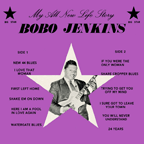 Bobo Jenkins
Bobo Jenkins
“My All New Life Story”
Third Man Records/Big Star
This is a retrospective album that chronicles the early ‘60s/’70s recorded life and times of Detroit blues legend Bobo Jenkins. As with many of his blues contemporaries, Jenkins fled his home of Forkland, Alabama as a kid seeking a better life. He worked a lot of odd jobs—from janitor, to mechanic and truck driver. He practically toured the country until arriving in Detroit in 1942. Jenkins was a self-made man and a musical trailblazer in opening, arguably, one of the first independent recording studios in the Midwest. His Big Star Records studio on Joy Road in Detroit was host to, not only his own self-engineered and produced tracks, but it was a haven for Motor City comrades like “Little Daddy” Walton, Mr. Bo, “Little Junior” Canady, Baby Boy Warren, Washboard Willie and Little Sonny.
There are a dozen tracks here all written by Jenkins and lovingly mastered at Third Man Records in Detroit by Warren Defever. The album is pressed on high quality pink vinyl, and blues historian Fred Reif’s extensive liner notes, and first-hand accounts, are the perfect complement to a consummate listening experience. Many of the tunes feature Jenkins prominently in the mix on guitar and vocals, with a small combo of bass, drums and organ. Occasionally, horns or harmonica would be added. Personnel credits are somewhat sketchy but prominent Ann Arbor musicians like guitarist John Nicholas, harpist Steve Nardella, bassist Sarah Brown, future Fabulous Thunderbirds drummer Fran Christina and a host of Detroit luminaries factored heavily in the performance of these songs. This collection is a cross-section of some of the best material from his “Red,” “Green” and “Yellow” album periods—so named for the colors of the respective original album jackets. “New 44 Blues” kicks off Side One, with a very loose and contemporary sound and feel. The mid tempo shuffle here is relaxed and funky. “I Love That Woman” picks up the pace in a more up tempo manner. Jenkins’ emotive vocals and chunky guitar work set this one in motion. “First Left Home” features a cool oscillating Leslie-speakered guitar tone. This adds to the rustic down home feel. “Shake ‘Em On Down” was a local hit and one of Jenkins’ signature tunes. Another highlight is the swinging “Here I Am a Fool in Love Again.” Jenkins really wails on vocals, with a nice addition here of harmonica. Side One concludes, with the 1974 update, of his early ‘50s tune “Democratic Blues,” called “Watergate Blues.” Jenkins sang about all aspects of life and, obviously, social issues and politics were part of his musical oeuvre as well. Jenkins sprinkles stinging single note lines and fast rhythmic changes all over Side Two’s opening single “If You Were the Only Woman.” It’s a juke joint jump blues tune that really cooks. “Sharecropper Blues” follows and is very auto-biographical. Jenkins sings about making the move north to work in Detroit factories, yet still feels it’s hard to make ends meet. In it he sings: “What the world is going on? I must be still sharecropping ‘cause half my money is gone!” “Trying to Get You Off My Mind” is a typical love gone wrong song. “I Sure Got to Leave Your Town” features some of those aforementioned horns. Jenkins demonstrates a nice vibrato and resonance in his vocals that blends really well, with the Chicago-styled brass section. Punchy horns also add some spark and vigor to one of his other signature hits “You Will Never Understand.” It’s a seamless mix of a smooth arrangement coupled with raw emotion. The album concludes, with the static-laden and wah-wah guitar of “24 Years.” The primal fidelity of the guitar and Jenkins’ smooth vocals are a template for some of the indie alternative rock that has been so embraced by the Motor City and beyond.
Bobo Jenkins was one of the originators of the Detroit blues sound. Thanks to Third Man Records, current and future generations can learn about and embrace this essential and legendary artist.—Eric Harabadian
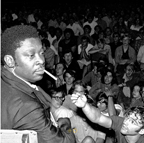
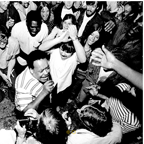 Ann Arbor Blues Festival 1969,
Ann Arbor Blues Festival 1969,
Vol. 1 & 2
Various Artists
Third Man Records
This is a review that spans two volumes of individual 2 deluxe LP 130-gram vinyl packages. Over August 2nd & 3rd, 1969 at Fuller Flatlands on the University of Michigan campus the first Ann Arbor Blues Festival took place. These two separate 4 LP retrospective vinyl sets were produced by Parker and Jim Fishel. Jim Fishel was an enterprising U of M student promoter who, along with his brother John, gathered like-minded friends in organizing and, ultimately, recording this momentous occasion for posterity. The recorded results are “field” recordings in the truest sense of that description. Jim Fishel and company literally took advantage of their all-access status going from set to set recording blues legends on a small Norelco ¼” tape recorder. Although the artist performances are recorded in crystal clarity, the audience chatter and noise is captured as well and adds to the excitement. The tapes were stored by Jim Fishel in his home for nearly 50 years. His son Parker, a music archivist, unearthed the tapes. What he discovered was a treasure trove of some of the finest blues artists and performances to ever grace the stage.
Both separate volumes feature too many performances to all be included in detail here, but the jaw-dropping list of headliners on Volume One includes Roosevelt Sykes, Arthur “Big Boy” Crudup, J.B. Hutto, Jimmy Dawkins, Junior Wells, B.B. King, Mississippi Fred McDowell, Pinetop Perkins, Luther Allison, Clifton Chenier, Howlin’ Wolf and Otis Rush. Volume Two spotlights key performances from Muddy Waters, Charlie Musselwhite, Magic Sam, Shirley Griffith, Big Mojo Elem, T-Bone Walker, Big Mama Thornton, Big Joe Williams, Sam Lay, Lightnin’ Hopkins, James Cotton and Son House.
1969 was such a pivotal year for music, with Woodstock and other related music events looming large at this point in time. But to have all these legendary artists together, over two days at one singular event, was truly unprecedented. And judging by the way the crowd and musicians related to each other everyone there felt a shared exchange of positivity and love. Favorite moments for this reviewer have to be pianist Roosevelt Sykes’ bawdy crowd-pleasing “Dirty Mother For You,” J.B. Hutto’s incendiary “Too Much Alcohol,” B.B. King’s nakedly emotive “I’ve Got a Mind to Give Up Living” and Howlin’ Wolf’s rousing “Hard Luck.” And for all the rock ‘n roll historians in the house one would be remiss not to make note of truly landmark performances by the groundbreakers for Janis Joplin, The Rolling Stones and so many others, with T-Bone Walker’s stinging “Call it Stormy Monday” and Big Mama Thornton’s classic “Ball and Chain.” And, to top it all off, the seminal Son House—who apparently almost missed his call time to appear—closed the festival with the show-stopping “Death Letter Blues.”
Third Man Records presents two volume record packages, complete with full-size book inserts filled with extensive liner notes by blues archivists and historians Sophie Abramowitz, David Beal and Parker Fishel. They provide comprehensive history on the origins of the festival as well as detailed biographies, select discographies and candid black and white photos of all the artists that appeared at the event. This is a moment in time that will never be replicated and “Ann Arbor Blues Festival 1969 Volumes 1 and 2” are essential additions to any serious blues and Americana music fan’s personal library.—Eric Harabadian
Home
/ Blues Blogs /
Artist Links / Blues
Links / Videos / Store
Subscribe / Advertise
/ Back Issues
/ Contact / Staff